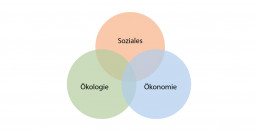Sustainability is a concept that has become a keyword in almost all areas of our lives, especially in the last few years. Companies are also aware of their responsibility and are constantly looking for new ways to operate in a more environmentally friendly and sustainable way. In order to take effective action in this regard and to establish individual strategies for companies, it makes sense to follow existing models and goals. We are going to explain in more detail the most important basic principles relating to the subject of sustainability within a company and will give you tips on how to apply them.
What does sustainability mean in business?
Generally speaking, sustainability is an operating principle that involves using natural resources as effectively and sparingly as possible in order to maintain the earth’s natural balance. This means that resources should only be used to the extent that they can be regenerated. There are many sides to sustainability and it’s useful to focus on different aspects depending on the type of company.
Benefits of sustainability in business:
- Environment: Sustainable actions primarily support our environment. As well as conserving resources, other strategies are involved to protect people, animals and habitats in the long term.
- Economy: Costs can be saved in the long run when resources and labour are used efficiently and when products are recovered and recycled.
- Cost savings: Using sustainable raw materials that can be procured as locally as possible helps to save costs in production. Manufacturing products in the company’s own country means shorter transportation routes, which saves valuable fuel, protects the environment and also contributes to keeping transport costs as low as possible. Find out more about production in Germany and the ‘made in Germany’ designation of origin.
- Valuation: If a company places value on sustainable business practices and environmentally friendly processes, for example by manufacturing sustainable products, this is usually positively perceived and valued by consumers as well as current or potential employees. Consumers can collaborate with companies through conscious consumption to protect the environment together.
uvex takes these aspects to heart and actively implements them on a day-to-day basis. Find out now what sustainability means to uvex.
Sustainability management and monitoring
Sustainability is important – that much is clear. But how can sustainability be implemented in companies in the long term and how can they understand their progress and setbacks? There are several approaches and concepts that make sustainability measurable for this very purpose.

Corporate Social Responsibility (CSR)
Corporate Social Responsibility (CSR) includes economic measures that are designed to contribute to sustainable development. CSR refers to contributions that are voluntary and therefore go beyond a company’s legal requirements.
Global Reporting Initiative (GRI)
Global Reporting Initiative (GRI) is a non-profit organisation that was founded in 1997. It has developed guidelines for sustainability reporting that are internationally recognised as a reporting standard and are the most widely used guidelines around the world compared with other frameworks. The GRI Standards are designed to establish reporting of sustainability standards within a company. They also aim to create a sustainable worldwide economy in which organisations act responsibly with regards to the environmental, social and economic impacts of their activities and report on them transparently.
A company’s reporting will then be assessed to ensure it is clear, balanced, accurate, reliable, comparable and up-to-date. With its series of requirements including GRI Universal Standards, GRI Sector Standards and GRI Topic Standards, the initiative supports companies in identifying relevant topics for their sustainable development. Since July 2018, CSR reporting is also based on GRI Standards.
uvex’s sustainability report that has been checked by GRI and complies with GRI Standards can be found on our website.
Sustainability strategies for companies
To drive sustainability management and monitoring even further, companies can focus on different principles. These help to find areas where potential for sustainable activity can be identified and provide support for companies when defining their sustainability figures and implementing specific goals.
With regards to sustainability potential, uvex has identified four areas within the company: environmental transformation, social responsibility, the circular economy and harmful substance management for environmentally friendly materials that do not pose a threat to people’s health. See our website for more information on uvex safety’s sustainability figures.
Three pillars of sustainability (sustainability triangle)
Different aspects of sustainability are often considered as part of the so-called ‘three-pillar model’ or sustainability triangle. The pillars of sustainability are environmental, economic and social and these aspects are also known as the dimensions of sustainability. According to this model, sustainable development can only take place when these three aspects interact with one another and are dealt with simultaneously and in equal measure.

Image: Venn diagram of the three-pillar model of sustainable development
- Environmental sustainability: This part of the three-pillar model addresses responsible interaction with the environment and responsible use of natural resources such as water, energy and raw materials.
- Economic sustainability: The economic pillar requires sustainable business practices. This means that a company that operates as sustainably as possible will continue to generate profits. This is the only way to ensure fair pay, use of high-quality raw materials and other sustainable developments.
- Social sustainability: The social aspect of sustainability refers to interaction with people and to their working conditions. People should be guaranteed social justice, safety, fair wages, continuing development and the freedom to achieve their personal goals. Social interests are also included in this aspect.
The area of Governance as part of the ESG criteria provides an addition to the three pillars. The first of the criteria is Environmental, i.e. using resources and water responsibly and protecting the climate and biodiversity. The second is Social, which refers to the health and safety of employees, demographic changes and food security for the population. The third of the criteria is Governance. This third aspect includes supervisory structures, the area of compliance and corruption as well as risk and reputation management. Governance therefore refers to sustainable corporate management, which should ensure on a quasi meta level that agreed sustainability measures are successfully implemented.
17 sustainability goals (UN sustainability goals)
With its 2030 Agenda, the United Nations (UN) specified 17 goals for sustainable development in 2016. These goals should be pursued in the 15 years between 2016 and 2030 and are based on the three-pillar model described above.
The goals act as a rough set of guidelines for companies when it comes to sustainability. The core objective is to ensure universal sustainable development around the world. The resulting social benefits help to create healthy lives and prosperity for everyone, which will have a positive impact on the economy and therefore companies in the long term.
The 17 goals of the United Nations are:
- no poverty
- zero hunger
- good health and well-being
- quality education
- gender equality
- clean water and sanitation
- affordable and clean energy
- decent work and economic growth
- industry, innovation and infrastructure
- reduced inequalities
- sustainable cities and communities
- responsible consumption and production
- climate action
- life below water
- life on land
- peace, justice and strong institutions
- partnerships for the goals
From these overarching goals, uvex has identified four target areas for sustainable, responsible actions:
- strive for environmental transformation to achieve climate neutrality
- take social responsibility for a positive change in society
- ensure a circular economy for long-lasting products and the efficient use and recycling of resources
- optimise harmful substance management to protect people’s health and the environment
Sustainability guidelines and sustainability seals
If you as a company actively promote sustainability and regularly monitor your progress, you will of course want to share your successes with your employees and potential customers. There are a wide range of sustainability seals and guidelines for different industries for this very reason.
CSR and GRI: the CSR and GRI measures described above apply in Germany as the reporting standard for sustainability in companies.
ISO-45001:2018: The ISO-45001:2018 standard specifies requirements for occupational health and safety management systems and is therefore relevant to the field of occupational safety. Its goal is to promote the health and safety of employees by, for example, preventing workplace accidents and sick leave as a result of activities at work. Compliance with this standard can only be asserted by organisations that have occupational health and safety management systems in place that meet all requirements.
ISO-26000:2010-11: The ISO-26000:2010-11 standard provides guidance on social responsibility and helps organisations to integrate appropriate behaviour into their existing systems, processes, strategies etc.
Sustainability at uvex
As an international company with a history of almost 100 years, at uvex we see sustainability in all its aspects – environmental, economic and social – as an important foundation.
We are therefore particularly proud that the uvex safety group has been awarded ISO-14001 certification by TÜV Süd. Find out more about sustainability at uvex, explained in 5 infographics, as well as our sustainable work clothes, environmentally friendly, ergonomic eye protection and sustainable construction.